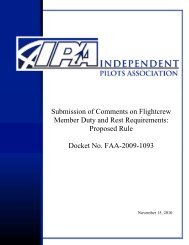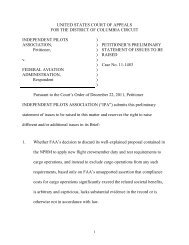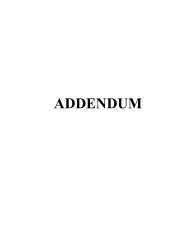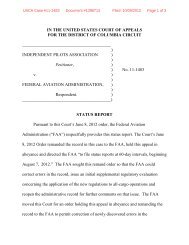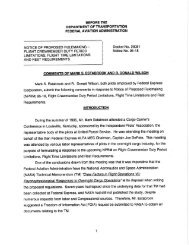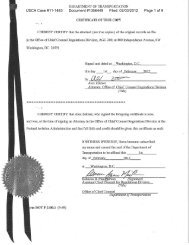Exhibits Vol 2 - Independent Pilots Association
Exhibits Vol 2 - Independent Pilots Association
Exhibits Vol 2 - Independent Pilots Association
You also want an ePaper? Increase the reach of your titles
YUMPU automatically turns print PDFs into web optimized ePapers that Google loves.
Fatigue and performance 261<br />
the primary aim of the present study was to compare the effects impairment of performance on this task may have occurred if<br />
of alcohol intoxication and sustained wakefulness. Given that we had extended the period of sustained wakefulness. It is<br />
the experimental design meant that a greater number of testing interesting to note that several studies (e.g. Dinges et al. 1988)<br />
sessions occurred in the sustained wakefulness condition, it have reported that tasks similarly lacking in complexity, such<br />
was considered possible that boredom related to excessive as simple reaction time tasks, are affected early and profoundly<br />
testing may have contributed to the performance decrement by sleep loss, thus strongly suggesting that monotony may<br />
observed. However, given that in the alcohol condition an increase sensitivity to sustained wakefulness. Indeed, the fact<br />
equivalent, if not greater, effect was observed for four of the that this task was not vulnerable to fatigue may possibly be<br />
six performance variables, we believe it unlikely.<br />
explained by the interesting and challenging properties of the<br />
Equating the effects of the two conditions indicated that task.<br />
17–27 h of sustained wakefulness (from 23.00 to 10.00 h) and It is also noteworthy that while we observed a decrease in<br />
moderate alcohol consumption have quantitatively similar accuracy on the grammatical reasoning task, impairment of<br />
effects on neurobehavioural performance. Indeed, the findings this performance parameter was not comparable to that<br />
of this study suggest that after only 20 h of sustained produced by a BAC of 0.10%. While this may at first contradict<br />
wakefulness, in the early hours of the morning, performance the suggestion that in this study vulnerability to fatigue was,<br />
impairment may be equivalent to that observed at a BAC of to a large degree, determined by task complexity, it should<br />
0.10%. be noted that participants were instructed to concentrate on<br />
This study has confirmed the suggestion made by Dawson accuracy rather than speed when completing the grammatical<br />
and Reid (1997) that moderate levels of fatigue produce reasoning task. Thus, our particular instructions to participants<br />
performance decrements equivalent to or greater than those may explain, at least in part, this irregularity. Alternatively,<br />
observed at levels of alcohol intoxication deemed unacceptable this finding is in line with the suggestion of a natural speedaccuracy<br />
when driving, working and/or operating dangerous equipment.<br />
trade-off. Similar results have been observed in several<br />
More importantly, however, this study was designed to studies, which report a decline in speed of performance, but<br />
determine whether the results of Dawson and Reid (1997) were not accuracy, when sleep-deprived subjects are required to<br />
an isolated finding, or characteristic of the general cognitive perform a logical-reasoning task (Angus and Heslegrave 1985;<br />
effects of fatigue. Using the degree of impairment caused by Webb and Levy 1982).<br />
alcohol that produced a BAC of 0.10% as a standard, this Interestingly, this was not the case with the vigilance task.<br />
study systematically compared the effects of fatigue on a In this instance, despite instruction to concentrate primarily<br />
range of neurobehavioural tasks. Results indicate that while, on accuracy, this component was slightly more vulnerable to<br />
in general, fatigue had a detrimental effect on psychomotor fatigue than was response latency. The absence of a trade-off<br />
performance, the specific components of performance differed on this task may be explained by the different properties of<br />
in their degree of sensitivity to sleep deprivation.<br />
the vigilance and grammatical reasoning tasks. In accordance<br />
The observed differences between the performance tasks with with the distinction raised by Broadbent (1953), the latter of<br />
respect to their vulnerability to fatigue can be explained by these tasks can be defined as an unpaced task in which the<br />
their relative degrees of complexity. That is to say, the more subject determines the rate of stimuli presentation. In contrast,<br />
complex neurobehavioural parameters measured in the present the vigilance task can be defined as a paced task in which<br />
study were more sensitive than were the simpler performance stimuli are presented at a speed controlled by the experimenter.<br />
parameters. While only 20.3 h of sustained wakefulness (at In line with this distinction, our findings are consistent with<br />
03.00 h) was necessary to produce a performance decrement those of Broadbent (1953) who observed that while a paced<br />
on the most complex task (grammatical reasoning) equivalent task rapidly deteriorated during the experimental period, in<br />
to the impairment observed at a BAC of 0.10%, it was after terms of speed, an unpaced version of the same task did not.<br />
22.3 (at 05.00 h) and 24.9 h (at 08.00 h) of sustained wakefulness A further explanation for the differences observed between<br />
that a similar result was seen in a less complex task (vigilance these two tasks may relate to the extremely monotonous nature<br />
accuracy and response latency, respectively). Furthermore, on of the vigilance task. Indeed, we believe it likely that subjects<br />
the unpredictable tracking task, a slightly less complex task were more motivated to perform well on the grammatical<br />
than vigilance, a decrement in performance equivalent to that reasoning task, which was generally considered more interesting<br />
observed at a BAC of 0.10% was produced after 25.1 h of and challenging. Hence degree of motivation may explain why<br />
wakefulness (at 08.00 h).<br />
measures of both speed and accuracy decreased on the vigilance<br />
It was observed that despite a slight downward trend task, while on the former task accuracy remained relatively<br />
performance on the simplest of the four tasks did not stable. This suggestion is in line with previous studies which<br />
significantly decrease, even following 28 h of sustained have found that motivation can, to a degree, counteract the<br />
wakefulness. In contrast, performance on this task was effects of sleep loss (Horne and Pettitt 1985).<br />
significantly impaired after a dose of alcohol that produced a It is worth noting that while the effects of alcohol and fatigue<br />
BAC of 0.10% (or greater). These results are in line with the were generally similar there were exceptions. As mentioned, it<br />
suggestion that simple tasks are less sensitive to sleep was observed that fatigue had a greater effect on the response<br />
deprivation (Johnson 1982). Indeed, we believe it likely that time component of the grammatical reasoning task than on<br />
© 1999 European Sleep Research Society, J. Sleep Res., 8, 255–262



